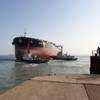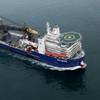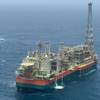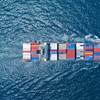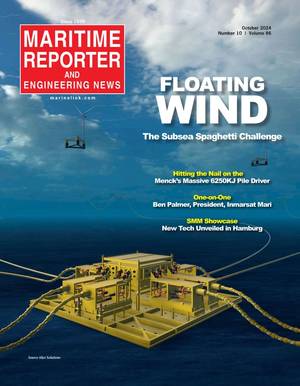ABS and CCS Discuss Energy Development in China
The growing importance of deepwater exploration and production developments offshore China led classification societies ABS and CCS (China Classification Society) to conduct a joint “Deepsea Developments in the China Offshore Industry” meeting on June 17. The meeting, which was held in Beijing, brought together leading offshore industry professionals to discuss a wide range of energy development issues.
More than 100 representatives from the Chinese government, shipbuilders, designers, research institutes, energy corporations and universities attended. Topics included a discussion of the global energy market outlook from research firm Infield Systems, the challenges and latest solutions proposed for deepwater development from offshore solutions technology leader Horton Wison and a look at risk-based operations and new approaches toward minimizing risk with deepwater exploration from global engineering, procurement and construction firm Worley Parsons.
ABS discussed the regulatory changes resulting from the Macondo incident in the Gulf of Mexico and the broader impact on regulatory schemes worldwide while CCS highlighted the impact of deepsea development on the technology standards for the region’s offshore industry.
“This industry meeting illustrates the cooperative spirit between ABS and CCS,” says ABS CEO and President Christopher J. Wiernicki. “Over the past decade, China has significantly grown in its importance to both the maritime and offshore industries. With our experience and leadership in setting standards for the offshore industry, ABS can bring valuable assistance to the region as it faces new exploration and production challenges.”
It is this experience that led to ABS’ and CCS’ joint involvement on the massive Liwan 3-1 gas field development in the South China Sea. The Liwan 3-1 development is China’s largest offshore natural gas discovery to date and will be the first deepwater development project.
It is widely known that China has begun to invest heavily in deepsea exploration as the country’s economic growth demands more energy resources. “We are helping to support our country’s efforts by providing the technical guidance necessary for safe and efficient exploration,” said Li Kejun, CCS Chairman and President. “This industry meeting shows our commitment to helping achieve deepsea technological advancements in the region.”
Also in attendance was President of the China Association of the National Shipbuilding Industry (CANSI) Guangqin Zhang. While China’s shipbuilding industry has been challenged by the global economic recession, the accomplishments of China’s shipbuilding industry are well known, as is its rapid diversification into the gas and offshore sectors. “Meetings such as these contribute to the intellectual discussion and allow for the introduction of new offshore technologies in our shipyards, new technologies that will position the region for successful deepsea exploration,” Zhang said.
In November 2010, ABS and CCS strengthened their collaborative efforts, formally established in 1993, by entering into a new Cooperative Agreement with offshore as a key area of focus for the two classification societies.
As a further demonstration of ABS’ long-term commitment to the Greater China region, in May 2011, ABS established the ABS China Offshore Technology Center (COTC) in partnership with Shanghai Jiaotong University (SJTU). While the research efforts will support development activities in the Greater China region, applied research will also be conducted on a wide range of energy development issues. The COTC is ABS’ fourth offshore-focused research center.



